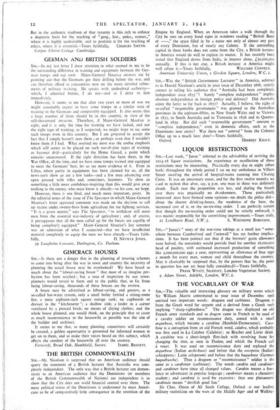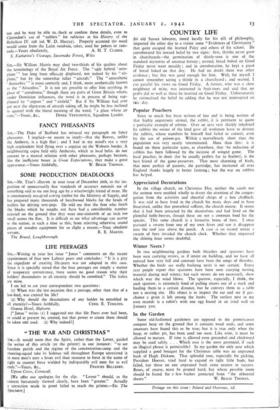THE VOCABULARY OF WAR SIR,—The valuable and interesting glossary on
military terms which Sir William Marris contributed to your issue of December 19th omitted two important words: dragoon and carbineer. Dragoon is from the Greek word for serpent and is derived from a Greek verb implying " sharp-sightedness." The dragon was displayed on old French army standards and so dragon came in French to be used of a cavalry soldier on reconnaissance duty, armed with a small arquebuse, which became a carabine (Hatzfeld-Darmesteter). Cara- bine is a corruption from an old French word, calabre, which probably was first used in La Calabre (Calabria): so Bracher and Littre think. A carabine was a short-length flint-lock with revolving front for changing the shot, as seen in Dudon, and which the French -call a rouet. It was used on reconnaissance duty and replaced the arquebuse (Italian archi-buso) and before that the escopette (Italian) schioppetto: Latin sclopetum) and before that the haquebute (German haquebusche). Thus a dragoon or "reconnaissance " soldier is the same as a carabinier (carbineer). The words carabin and carabinier and carabiner have since all changed values. Carabin means a free- lance or adventurer in popular language ; carabinier means a chemistry student ; and carabine is used for excessive: thus une plaisantene carabinee means " devilish good fun."
Sir Chas. Oman of All Souls College, Oxford. is our leading military statistician on the wars of the Middle Age• and of Welling-
ton and he may be able to, check or confirm these details, even to CJarendon's use of "nablets" for rablettes in his History of the Rebellion IV. 198 (ed. W. D. Macray). Properly accented the word would come from the Latin rutabula, rakes, used for pokers or ram-



























 Previous page
Previous page